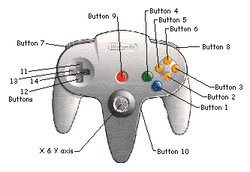 The same company that brought us the NES Advantage has proven the Wii control scheme isn’t as bad as critics speculated. The beauty of adding the “waggle” technology is limiting your button count to a reasonable level without overwhelming gamers.
The same company that brought us the NES Advantage has proven the Wii control scheme isn’t as bad as critics speculated. The beauty of adding the “waggle” technology is limiting your button count to a reasonable level without overwhelming gamers.
We’re seeing casual gaming on the rise both in the press and in the public. Yet, each “next generation” console brings new features and functionality to the consoles, games and accessories. Since NES birthed the SNES we’ve seen button count increase on controllers.
Nintendo has usually been conservative on buttons, trying to work “shape” over sheer volume of buttons, barring the C button count on the N64 controller. Nintendo controllers change shape with each generation and they’ve evolved, not innovated, their way around with the Wii control scheme. Each function of the controller exists, on its own, in other products but nobody has built a fully functional controller in such a way for a game console until now.
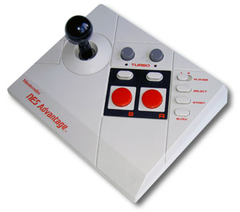 Sony took pieces of this concept in their PS3 controller and its ability to detect “tilt.” Xbox 360 stuck with the beefy controller with lots of buttons and analog sticks. Not just a D-Pad but two analog sticks and a ton of buttons to press, some pressure sensitive as well. What of our next-generation console? Maybe a few new buttons?
Sony took pieces of this concept in their PS3 controller and its ability to detect “tilt.” Xbox 360 stuck with the beefy controller with lots of buttons and analog sticks. Not just a D-Pad but two analog sticks and a ton of buttons to press, some pressure sensitive as well. What of our next-generation console? Maybe a few new buttons?
Or, maybe a few new motions? Wii evolved the control scheme and Sony validated their decision, what’s next? Are the controllers just too damn complicated in today’s world? Or, perhaps limiting the buttons brings in more gamers, like Grandma and Grandpa, to play your console as well.
“I think you could do things with a built-in camera or a little motion sensitivity. You look at the Wii controller with less buttons – they added functionality by doing waggle. Not a lot of games use the waggle well, but Super Mario Galaxy for example uses it perfectly. Zak and Wiki uses it rather well,” said Cliff Bleszinski of Epic Games.
CliffyB is a game designer at Epic Games and, believe it or not, when he starts to question the sheer amount of buttons, he’s probably echoing the sentiments of other game designers. He also said, “if you look at a controller right now it looks like an alien spaceship.”
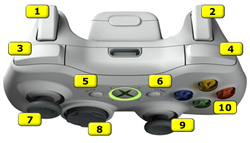 Why does it matter what Cliff thinks? He’s a game designer and his goal is to make his studio and their publisher a lot of money in video game sales. He wants to get his product to “the hands” of the largest audience possible in order to build the best bank roll. The more people who can utilize your game with the mechanics of the controller the better chance you’ll have a block buster title (at least in terms of sales).
Why does it matter what Cliff thinks? He’s a game designer and his goal is to make his studio and their publisher a lot of money in video game sales. He wants to get his product to “the hands” of the largest audience possible in order to build the best bank roll. The more people who can utilize your game with the mechanics of the controller the better chance you’ll have a block buster title (at least in terms of sales).
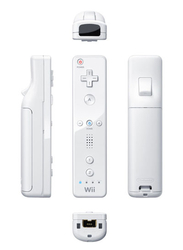 The Nintendo DS utilizes the same button position as all the hand helds from Nintendo and reflects the look and feel of the old Game and Watch titles. The simple control scheme has worked for years, continues to sell hundreds of thousands in unit sales and contains a huge library of games. It also uses “touch and feel” mechanics to expand the game play design with intuitive stylus mechanics.
The Nintendo DS utilizes the same button position as all the hand helds from Nintendo and reflects the look and feel of the old Game and Watch titles. The simple control scheme has worked for years, continues to sell hundreds of thousands in unit sales and contains a huge library of games. It also uses “touch and feel” mechanics to expand the game play design with intuitive stylus mechanics.
The DS shows exactly how new technology in touch and feel can expand the controller without adding buttons just as the Wii has shown us a fourth dimension of game control. Perhaps, the future of gaming involves utilizing new technologies to break the need for yet more old style button clicking.
Are game controllers too complicated?

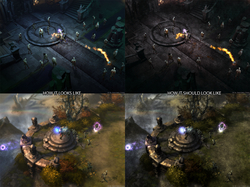 There has been many debates on the graphic level of Diablo 3 and how it should be different. Finally a developer comes out and says “um, no.” Their reasoning is fairly simple, it’s one thing to photoshop up a screenshot with some filters but it’s another to get the texture and lighting to run at that detail on a standard computer.
There has been many debates on the graphic level of Diablo 3 and how it should be different. Finally a developer comes out and says “um, no.” Their reasoning is fairly simple, it’s one thing to photoshop up a screenshot with some filters but it’s another to get the texture and lighting to run at that detail on a standard computer.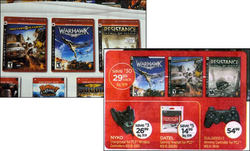 It’s that time in the life-cycle of the PlayStation 3 where a few of their hit titles go into “classic” game mode, which translate to a price drop. We saw this with a few games like Kameo on the Xbox 360 a year or so after the launch of the console.
It’s that time in the life-cycle of the PlayStation 3 where a few of their hit titles go into “classic” game mode, which translate to a price drop. We saw this with a few games like Kameo on the Xbox 360 a year or so after the launch of the console.
More buttons please, until I’m able to crouch jump, aim, shoot and switch weapons with a controller all at the same time I wont be happy.
Game controllers aren’t that complicated at all. We expect our games to be able to do more than just jump & shoot and move in 4 directions. So we need controllers that can do more. Xbox’s an Playstation’s controllers fit right into your hand. Wii’s controllers do have less buttons but it’s kinda like holding your TV remote.
Tell ya what, if the Xbox’s controller is too complicated go back to the Atari 2600 Joystick.
I think the theory is, if they’re getting more complex, we some developers think perhaps we don’t need more buttons, but more “options” such as full movement, acceleration and special detection in the joystick itself. Imagine, rather than having another four buttons for features, we have a shake-left ot reload, shake-right to spin around, etc.
Gotta disagree with you. For a non-gamer, a controller might be intimidating, but I’ve been palying games since the NES; I know my way around a controller pretty well by this point.
I hate the Wii-mote, BTW.
The issue, marketing wise, is the “non-gamer” is the largest piece of the consumer pie. I’ve also been playing since the NES (and before that on the 2600) and I can adapt to whatever is created at this point, with a low learning curve.
But we make up a small sliver of potential gamers in the market. The more consumers you can drag into the game environment the better for your profit.
A great example, I used to *love* watching the WWF (now WWE) back in the mid-80’s early 90’s and then it went all drama and love triangle and storyline. No more 25 minute epic wrestling matches, no more mega battles between titans… it all became All My Children in nature; soap opera.
I stopped, I couldn’t deal with it, but you know what that did for the WWE? It put them on a new level of the industry in which more and more viewers consumed it and fell in love with the “sport.”
I was fine with the way it was progressing until they made it more of a public affair. If it were just people like me the WWE would probably still be a small time entertainment sport. However, the amount of money their making now on merchandise, pay-per-view events and all the affiliations and partnership is huge. They may have decided not to cater to me, the small piece of the pie, but the bigger picture was a tremendous success which you cannot really fault them for.
The Wii has shown the industry what type of numbers you can get from non-gamers and casual gamers, now it comes down to “do we want to expand it” much like the WWE did, and lose some of the hardcore people, or do you want to keep it more of a niche industry?
It’s still undecided I think, but we’re seeing new paths form which may change the industry forever.
Oddly enough, I was a huge WWF fan too. (Loved when Flair won the Royal Rumble in 1992), and I too, haven’t been interested since they watered it down.
Once you start to court a wider group of people, you have to be accepting of a wider group of demands and expectations of what your product should be.
I agree that Nintendo, from a business perspective is doing the right thing, and I don’t fault them for it, but as an old school gamer, I kind of feel like I’ve been sold down the river a little bit, and worry that this will eventually lead to a watered-down industry.
I’m confident that, no matter what happens, this industry has a lot of potential in all directions in a broad depth.
Unlike the WWF, once they changed up and we left, we had nothing but the other two wrestling shows to watch, which were all purchased by WWF or simply failed.
The game industry is much different. Where a wrestling show may fail because of the utter cost to produce it and hire talent, game developers have gotten creative with costs and overhead… those driven to succeed will succeed.
Even if the Wii “sells out” to a larger crowd and Sony along with Microsoft go down that same route, a competitor will arise to fill the niche gaming that many of us veterans of the industry demand.
Why? We might be the smallest piece of the pie in terms of generating sales but we tend to spend a lot on the products and become “fan boys” and very passionate about our products, thus the niche would be strong. Even if it only was to capture 5% of the gamers, they should be able to keep costs down enough to cater to them.
As long as there is a demand, there will be someone coming along to fill it.
As for Nintendo, I don’t think they’ve changed much since the 80’s. I think we, as gamers, have changed as we’ve grown. We expect something a bit different and in many ways, we’ve out-grown them. However, kids that were are the age we were back in 1985 are loving what the Wii has to offer. We may have outgrown it, but others are just starting to understand video games and the industry and have to start somewhere. Nintendo is a perfect point for them, and offers a few fun things for us now and again.
You know, I agree with you. There will always be video games that appeal to me, and I think I’m just being a bit doom & gloomy. That being said, watching Microsoft’s E3 press conference only hinted even more at my fears; In case you haven’t seen it, they spent more time hyping-up non-games, and the inclusion of Mii-like avatars, then they sepnt on GoW2 or Fable 2.
They’re also coming out with a motion controller of their own…
http://xboxoz360.wordpress.com/xboxoz360-gamers-e3-08-news-page/xbox-360-darwin-motion-controller-video-page/
Now when I bought a 360 2 and a half years ago, it was with the thought that it would be a hardcore gaming machine, which it satisfied, and will continue to satisfy. It’s just pretty lame that they want to change their direction to be more in line with Nintendo, because as a hardcore gamer, I think they’re doing fine.
Again, there I go with a pissed-off rant. Anyway, I think my best course of action is to take a step back and stick to what I like. It is entirely possible that I just fear change…though I still don’t like the direction the industry’s headed.
I will say Derrick that your arguments are well-written, and probably correct. I enjoy reading them.
Thanks for the compliments, I’m trying to look at it from the perspective of a sales/business and with a mix of “outside the box” style of thinking, rather than bringing too much hardcore gamer emotion into the picture.
This is easier now that I have two young kids. My daughter is five and, given the wife and I are both into video games and technology, I see how she reacts to specific games and technologies.
I can also understand why Microsoft would go the route of the control-scheme and a non-gamer attack on the industry. Microsoft’s not dumb, they react with the industry and can often be quick on the feet in terms of getting it done for the good of the share holders. The difference is, in this industry, Microsoft is the young cat.
Nintendo is the only hardware manufacturer still around from the days of coin-operated gaming–they’ve been around the block a few times. They’ve also seen what works, what doesn’t work and have industry veterans that were responsible for some of those great coin-op games like Donkey Kong and Mario Bros _still working_ for them.
It’s money vs. knowledge at this point. Microsoft’s learning what works, reacting to the competition and trying to stay ahead of the game constantly. Nintendo’s doing what they think will get their share holders industry growth year-over-year for the next ten years. They did something their competitors haven’t: written a game plan and stuck to it. Nintendo hasn’t tried to be the swiss army knife of consoles, they’re not focusing on home entertainment, network play, gaming, movie viewing and all that jazz. They picked a direction and they went full force into it.
Granted, many of us question their direction… but it’s getting results. For a gamer company it’s a huge risk to take your product in ten directions hoping half of them stick. Nintendo has one core product and a bunch of accessories and they’ve seen a few of their products do “okay” in the industry and some accessories flat out fail (Virtual Boy is a great example). They’ve learned a bit from the bumps along the way but they’re still not big enough to compete with Microsoft or Sony.
Those two guys can lose money for years before it matters. Microsoft’s got market share of their operating systems, IT infrastructure without Outlook, Microsoft Office, Exchange while Sony has movie labels, stereos, mp3 players, audio equipment, DVD and BluRay the list goes on.
For every dollar Sony or Microsoft lose they make two in their other industries. If Nintendo loses a dollar they’re down a dollar. Much more reason to stick to their path.
By mimicking Nintendo, Microsoft is recognizing their effort in the industry to be different and try something new ONLY because it has proven to work. If Nintendo failed, as so many predicted, you wouldn’t see another motion controller for ten years from Sony or Microsoft. However, Microsoft is still, in the end, all about the dollar and the share holder value. If that means trying their hand at non-gamers to increase product exposure and profit, they’re going to try and see how it goes. What’s the real risk? A few million dollars lost? They’re already in that hole 🙂
I think the gaming industry needs to move away from motion controls. Sure, tilting and waving is fun, but it limits the playability. What if I want to play my game in a rocking chair? The tilt sensitive function goes all out of wack with my every movement. Forget eating and drinking while playing, the little movements to reach for your beverage causes your character to jump off a cliff. I say they stick to buttons.